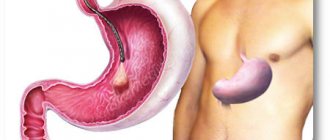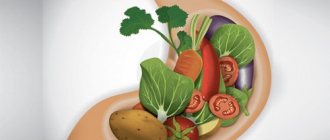When choosing food products in the supermarket and preparing food from them, we first of all think about the calorie content of the food, its chemical composition and expiration date, but we do not ask the question: how long does it take for food to be digested? Meanwhile, the process of assimilation of different nutrients occurs in different ways. And our well-being and health depend on how food is digested. The digestion time of food for different foods is different, and therefore mixed food can create heaviness in the stomach, intensify the processes of fermentation and putrefaction, and clog the body with toxins. But first things first…
Digestion of food: how does it happen?
The food we eat, after entering the body, is a source of nutrients necessary for growth, energy, and metabolic processes. The body is a real chemical laboratory where food must be broken down into chemical components and then used for its intended purpose. The digestion time of food in different parts of the gastrointestinal tract varies significantly.
Food passes through the digestive system, undergoing a number of transformations, mechanical and enzymatic, in each section:
- In the mouth, food is crushed and moistened with saliva. In saliva, the enzyme amylase begins the breakdown of carbohydrates.
- Several enzymes are already “working” in the stomach, aimed at digesting proteins and fats and curdling dairy products. Hydrochloric acid helps break down, simultaneously destroying microbes and neutralizing some poisons. Absorption of nutrients does not occur in the stomach. The products are there for a maximum of 3-4 hours.
- Enzymes continue to work in the duodenum, breaking down food into even smaller components, turning it into mush. This is where the absorption of substances into the intestines partially begins.
- In the small intestine there is already an active process of absorption of the chemical components of food, which enter the blood, are cleansed in the liver and are transported to their destination (cells). All these processes take 7-8 hours.
- The remaining nutrients are absorbed in the large intestine. Here, the remains of undigested food (slags) can remain for up to 20 hours.
- Through the rectum, waste products are removed from the large intestine from the body.
The gastrointestinal tract pushes food through the digestive tract using periodic contractions of smooth muscles, a process called peristalsis. It is not difficult to calculate how much time the body spends on digesting food. The entire digestion process takes approximately 24 hours. From several kilograms of food eaten per day and 2-3 liters of liquid drunk, 200-300 g of undigested residues are removed.
Important! Even before eating, a conditioned reflex “wakes up”: saliva is released in response to the feeling of hunger, and gastric juice is released in response to tasty smells. Enzymes also begin to be released at a certain time if you eat food strictly according to the clock.
How long does it take for dumplings to digest in the stomach?
Category: Dumplings
The interval spent on digesting food is a significant indicator, but usually no one takes it into account. Nutrients are a source of energy. By correctly arranging the components and calculating the time spent on processing a particular product, you can, without maintaining strict diets, always be in shape and not feel hungry. It is not necessary to keep an infinite number of numbers in your head; for this, a tremendous amount of work has been done by nutritionists and a generally accepted table of food digestion by time has been compiled. You should not layer meals unnecessarily, feelings of hunger, and if the body has not had time to process the product eaten the day before.
When consuming culinary delights, it is important to consider that the benefits, time of absorption by the body and the release of nutrients depend on many factors. Freshness, method of preparing the additive, compatibility - everything is important and requires special attention.
The main stage of digestion of foods is carried out in the stomach and can take from 30 minutes to 6 hours, while the processing period until defecation takes approximately 20 hours.
The speed of digestion is determined by the moment when food enters the intestines; to simplify the task, consumer products must be properly systematized:
Considering the digestion time of food can significantly improve your health. Ignoring this indicator, a person carries an impressive amount of rotting products, which adversely affects health and causes diseases of the digestive system and cardiovascular system. Moreover, poor, unhealthy nutrition negatively affects life expectancy.
In order for recycling to be complete, it is important to follow simple rules:
- By simultaneously consuming foods that require different intervals for digestion, the body is subjected to excessive stress, which makes no sense. Boiled potatoes eaten on their own could enter the small intestine in an hour, when in combination with pork they are doomed to be digested for a long 6 hours.
- The best solution for preparing your favorite dishes is a combination of products that require the same amount of time to process. This will allow you to spend a little more time than with mono nutrition, but this approach is most suitable when mixing.
- When using vegetable oils as a salad dressing, it should be taken into account that the processing time in the stomach will increase several times (2-3). Oil creates a coating on vegetables, which complicates the processing of salad components by gastric juices and enzymes.
- You should not drink food immediately after eating it with teas, water, or any drinks. After a meal, it is necessary to wait until the food passes from the stomach to the intestines. If the rule is violated, the saturation of gastric juice decreases, digestion worsens and the load on the digestive system increases. Water, diluting food, prevents complete digestion; because of this, whole fragments of food penetrate into the intestines and, as a result of the active action of putrefactive microorganisms, expose undigested food to decomposition and fermentation.
- By consuming water in its pure form, without additional inclusions, it goes directly into the intestines without delay.
- Any meal does not tolerate fuss. When consuming any product, you must chew the food carefully and slowly. Thanks to this simple action, you can significantly speed up the digestion process, since the stomach will not need to expend energy on grinding ingredients, and enzyme processing occurs thoroughly in the oral cavity.
- When eating food of animal origin that is rich in protein, it is important to understand that in a heated state it is digested for 2-3 hours, then goes to the thin section to continue the breakdown of valuable components from food components.
- Less time is spent on digesting cold dishes; proteins do not have time to be absorbed and enter the small intestine, where they create favorable conditions for the proliferation of bacteria, which subsequently cause discomfort in the digestive system (gas formation, constipation). It is the consumption of cooled or chilled food that leads to the accumulation of excess weight and the acquisition of a diagnosis of obesity.
- The best time to ferment food is lunchtime. If there is a need to mix incompatible products, it is better to do this during the day. Breakfast and dinner do not fully utilize the body's reserves. In the morning he has not yet woken up, in the evening he is already ready for sleep.
- Night time is a period of rest. During this period, food lies in the stomach as dead weight until the moment of awakening. Deposits of products undergo decomposition and have a negative effect on the body.
The time it takes for food to be digested in the human stomach can be controlled. It is important to understand how quickly each product undergoes enzymatic processing.
The most popular and frequently used ingredients are presented in the table.
Based on materials from doctorzkt.com
Sometimes, without being a doctor, it is worth delving into the details of the digestion process, assessing how long food passes through the gastrointestinal tract, and comparing the absorption of foods by duration. Why know how to digest food quickly? The body is good at this matter, let it deal with it itself. Because the unconscious choice of unsuccessful combinations makes the stomach harder and provokes complications. Let's see why it is important to know the digestion time of food.
Digestion in the stomach
A person prone to overeating throws different foods into his body as if it were a furnace. But firewood burns for approximately the same time, and different foods take different times to digest. Knowing how much a particular product is processed, you can intelligently approach the creation of a menu, selecting food that decomposes in approximately the same time.
Important! Proteins, fats and carbohydrates need different times to break down. Try not to eat too often, knowing that the previous portion is still in the stomach. If you add difficult-to-digest foods to your diet, your stomach will be heavy. Also, stop eating at least 4 hours before bed.
Digestion time for fatty foods
This can be pure fat, for example, lard, or simply fatty meat or fish, ice cream, and so on. Fat greatly inhibits gastric digestion. It is fatty foods that take the longest to digest. By the way, fatty fried meat, such as kebab, takes up to 72 hours to digest, and our body spends a lot of energy digesting such food. A person who regularly eats meat carries several kilograms of feces, which turn into waste and release toxins that poison the body. It is important not how long the food stays in the stomach, but in what form, digested or not digested (digested or undigested), it passes into the intestines, and what happens to it next.
Product groups by digestibility time
All products can be divided into four groups according to the duration of their processing by the stomach. How long does it take to digest what we eat?
Group 1. This includes mainly carbohydrates, processing time: 30-35 minutes. These are broths, light salads, natural juices, as well as fresh (raw) vegetables and fruits.
Group 2. This category contains proteins and some fats, processing time: 1-2 hours. This group includes eggs, milk, poultry, lean fish and seafood.
Group 3. These are products containing starch and complex carbohydrates, processing time: 2-3 hours. This includes nuts, legumes, cottage cheese, hard cheese, potatoes and cereals.
Group 4. This list includes foods that take longer to digest than others or are not digested at all. This includes coffee, canned food, stewed meat, mushrooms, bread and pasta.
Table of digestion times for individual foods in the stomach
| Food | Digestion time (min) |
| juice (from fruits or vegetables) | 15-20 |
| vegetables and fruits | 20-40 |
| vegetables that contain starch | 60-90 |
| egg | 45 |
| porridge | 120 |
| dairy | 120 |
| nuts and seeds | 180 |
| fish dishes | 60 |
| poultry meat | 150-180 |
| animal meat | 4-6 hours |
| mushrooms | 5 o'clock |
The table shows that the body digests carbohydrates the fastest. Next in ascending order are proteins and fats.
Important! Water without impurities does not need to be digested. It passes almost immediately into the intestines, which takes 10-15 minutes. In addition, it is an important component of our body, because every cell in the body consists of 80% water.
In addition to the types of foods, other factors also play an important role in the speed of digestion.
What affects the duration of food digestion?
- Temperature. Hot foods take longer to digest than cold ones. For example, okroshka requires less time to be digested by the stomach than borscht or oven-baked casserole.
- Meal time. Food is most actively processed during the day, during lunch. Food taken at breakfast and dinner takes longer to reach the intestines.
- Treatment. In boiled and fried foods, the enzymes characteristic of raw food are destroyed during the cooking process, and the stomach takes one and a half times longer to digest them.
- Combination. Their processing depends on how and with what a person mixes products. For example, an apple takes half an hour to digest, and hard cheese takes five hours.
- And the body processes a soft-boiled egg faster than a hard-boiled one.
Important! There is no need to eat until the stomach is empty of the previous portion of food. Then the problem of excess weight will be solved by itself and without heavy and strict diets it is easy to lose the hated kilograms.











